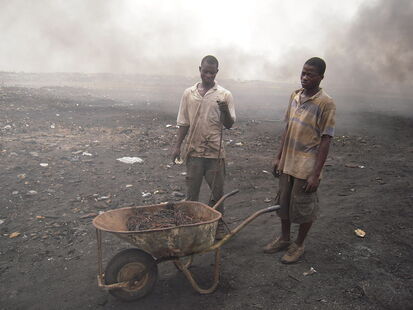
Climate change is one ecological challenge, among many, we face in 2019. The ecological crises intersect with other injustices. So it is nice to hear Climate Change discussed in the first Democratic primary debate, after this concern was ignored by politicians and the media in 2016. Millions of people are currently forced to choose between starving to death and becoming climate refugees, or as these suffering souls are called in the Global North, “illegal immigrants.” In an article on “Climate Apartheid,” UN Special Reporter Philip Alston suggests the wealthy will “pay to escape overheating, hunger, and conflict while the rest of the world is left to suffer.” (See image of e-waste workers). This should be considered in its full truth—the global poor are mostly not responsible for climate change (under 100 companies produce 66% of greenhouse emissions), suffer the most when it happens, and are being left behind or villainized by the worst climate offenders. In our imbalanced economic system, twenty-six individual billionaires have as much wealth as 50% of the world’s population, 3.765 billion humans. This is morally offensive and ecologically unsustainable. And why do billionaires disproportionately want policies that exacerbate climate change? The reduced GDP of poor nations have been an economic boon for wealthy nations. The world’s poorest nations have experienced a 17 - 31% decrease in wealth, while the richest nations are 10% richer due to climate change. And the richest individuals are richer than ever where the poor in even the richest country the world has ever known (the U.S. stock market is higher than ever) suffer from flooding, impure water, hunger, and overheating.
An approach to ecology must always take into account the economic system and the multiple crises we face. Many technological solutions to climate change would worsen other ecological crises—e.g., water pollution, plastic waste, e-waste, and species collapse. And some would absolutely destroy the lives of the poor around the planet. For instance Geoengineering schemes to “fix” climate change by blocking the sun will cause increased desertification and decreased crop yields, worsening both world hunger and the number of climate refugees. But they are suggested, even if only by fringe scientists, because they provide the most opportunity for profit by a small group of billionaires.
An approach to ecology, then, must also be intersectional. Poor brown, white, and black people are hurt the most by the effects of climate change. This is especially the case for people living in the Global South, who after becoming climate refugees are dehumanized by media and politicians in the Global North, put in concentration camps, arrested, or killed. Women have long been among the most impacted by the results of pollution and climate change; and have been on the forefront of intersectional & ecological activism. As activist Judi Bari said, “You cannot seriously address the destruction of wilderness without addressing the society that is destroying it.” And climate justice movements must include LGBTQ+ folk. Noah Goodwin writes, “LGBTQ people are already on the margins of society and that marginalization doubles when we look at queer youth. In shelters, LGBTQ people often face danger, which pushes them more to the streets; meanwhile, LGBTQ-specific homeless shelters often don’t receive enough funding to fully support their population. Making a change isn’t optional—it’s a necessity. In order to protect our community from the disastrous effects of climate change, we need to do more.” Goodwin then calls for LGBTQ groups to use their years of experience organizing to turn their attention to climate justice.
Though I don't identify as LGBTQ, nor am I a woman, nor brown, nor black, I long for what Judi Bari longed for—for groups working together to address the multifaceted challenges we face on this planet, challenges that have their roots in a specific destructive society. Acting together.
DJS
 RSS Feed
RSS Feed
